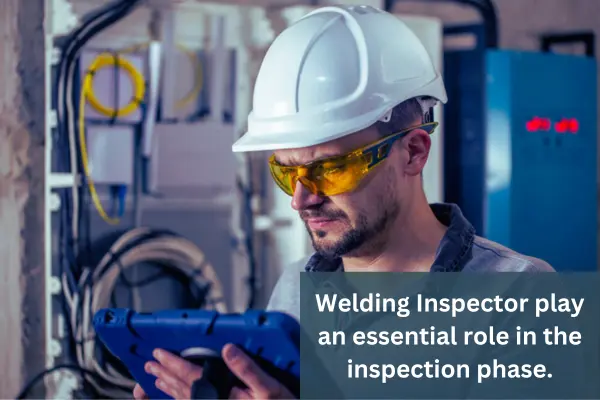Welding Supervisor Vs. Welding Inspector | Comparing the Key Responsibilities
Updated: 15 Jan 2024
159
Two important roles (welding supervisor and welding inspector) play a significant role in welding quality, safety, and durability. These professionals have the authority to check the welding operation and structural integrity. In other words, they maintain the welding industry standards.
Their names may sound similar, but their roles, responsibilities, and qualifications are quite different. In this exploration, we will learn the unique roles of welding supervisors and welding inspectors and also highlight their responsibilities in welding industries.
Welding Supervisor:
A welding supervisor is also known as a manager who is responsible for checking the whole welding process. The primary responsibilities of a welding supervisor are;
- Coordinating the welding team
- Managing the welding team
- Complete the project on time
- Complete project within budget
- Complete project efficiently

Duties of a Welding Supervisor:
1. Project Management:
The leading role of a welding supervisor is to manage the project, whether it is scheduling tasks, planning projects, or organizing resources.
2. Team Leadership:
Supervisors lead the welding team and provide guidance, training, and support. They manage staff, assign tasks, and encourage a positive work environment.
3. Quality Control:
Welding inspectors focus on detailed inspections while supervisors oversee the overall quality control process. They ensure that welding procedures bond to industry standards and project specifications.
4. Safety Compliance:
Welding supervisors also take care of the safety of the whole process. They also arrange safety meetings to force members to follow safety regulations.
Additional Details and Required Skills:
1. Certifications and Qualifications:
The qualification and certification of a welding supervisor are very important for a strong background in welding. They need certification like Certified Welding Supervisor (CWS).
2. Project Planning and Coordination:
They provide project planning, including evaluating project requirements, issuing resources, and developing project schedules. Effective communication and coordination skills are important for successful projects.
3. Budget Management:
They are also responsible for managing project budgets and trying to complete tasks within a specific budget.
4. Team Building and Leadership:
A welding supervisor will have a unique quality of building and controlling the team. They also have quality leadership, which motivates the team to work efficiently. Effective communication leads to success in various projects.
5. Problem-Solving Skills:
The most essential skill a welding supervisor needs is problem-solving skills. In difficult situations, they must make the right decision for project success.
Welding Inspector:

On the other hand, a welding inspector is an expert inspector who scans or examines the quality of welds. The primary responsibilities of a welding inspector are;
- inspection of welding
- Testing the weld quality
- Resolving problems
- Preventing future issues
Duties of a Welding Inspector:
1. Inspection and Testing:
Welding inspectors use different inspection methods such as visual inspection, radiography, and ultrasonic testing to confirm that welds meet the industry standards.
2. Documentation:
When a welder performs an inspection, he has a detailed record in the form of documents. These documents include weld reports and test results. This information is helpful for documenting projects.
3. Code Compliance:
Welding inspectors have deep knowledge of welding codes. They prevent defects in welding structures by using these codes and standards. They use these codes to ensure the weld works for a long time.
4. Problem Resolution:
Being human, we make mistakes in every field, and similar cases in the welding field. In welding, most issues occur in welds, and welding inspectors resolve issues with welds for future success.
Additional Details and Required Skills:
1. Certifications and Qualifications:
There are two types of certifications for a welding supervisor to enter the world of welding. These certifications are Certified Welding Inspector (CWI) and Certified Associate Welding Inspector (CAWI).
2. Detailed Inspection Techniques:
Welding inspectors are experts in detailed inspection techniques, including visual inspection, magnetic particle testing, radiography, and ultrasonic testing.
3. Code Interpretation:
The interpretation of different codes in welding is easy for welding inspectors. Organizations such as the American Welding Society (AWS) and the International Organization for Standardization (ISO) set these codes and standards.
4. Communication Skills:
Clear communication is vital for Welding Inspectors. They must effectively communicate inspection results to both the welding team and project stakeholders. Additionally, they play a role in educating others on welding standards.
5. Adherence to Safety Protocols:
Safety is a top priority for welding inspectors. They follow the safety protocols during inspections and minimize risks associated with the testing processes.
Faqs:
What is the highest-paid Welding Inspector?
The salary of a welding inspector can vary based on experience, location, and certification. Generally, the average Certified welding inspector salary in the US is $66,492 annually. The highest-paid welding inspector in the US is $88,500 per year.
What are the typical day-to-day tasks of a Welding Supervisor?
Following are the typical day-to-day tasks of a welding supervisor;
- Allocate resources
- Manage schedules
- Communicate with project stakeholders
- Addressing challenges during welding
Final Thoughts:
The project’s success depends on both the welding supervisor and welding inspector, but there are still differences between these characters. Welding supervisors focus on project management, team leadership, and overall quality, while welding inspectors inspect welds and resolve quality issues. Both roles are essential for achieving high-quality and safe welding processes in various industries.
Now you have a complete idea about these two characters, so if I ask which one you want to become in the future, let me know in the comment section. You can also read more about welding on this website because we wholly and solely work in welding. Thank you for visiting our website.
Please Write Your Comments